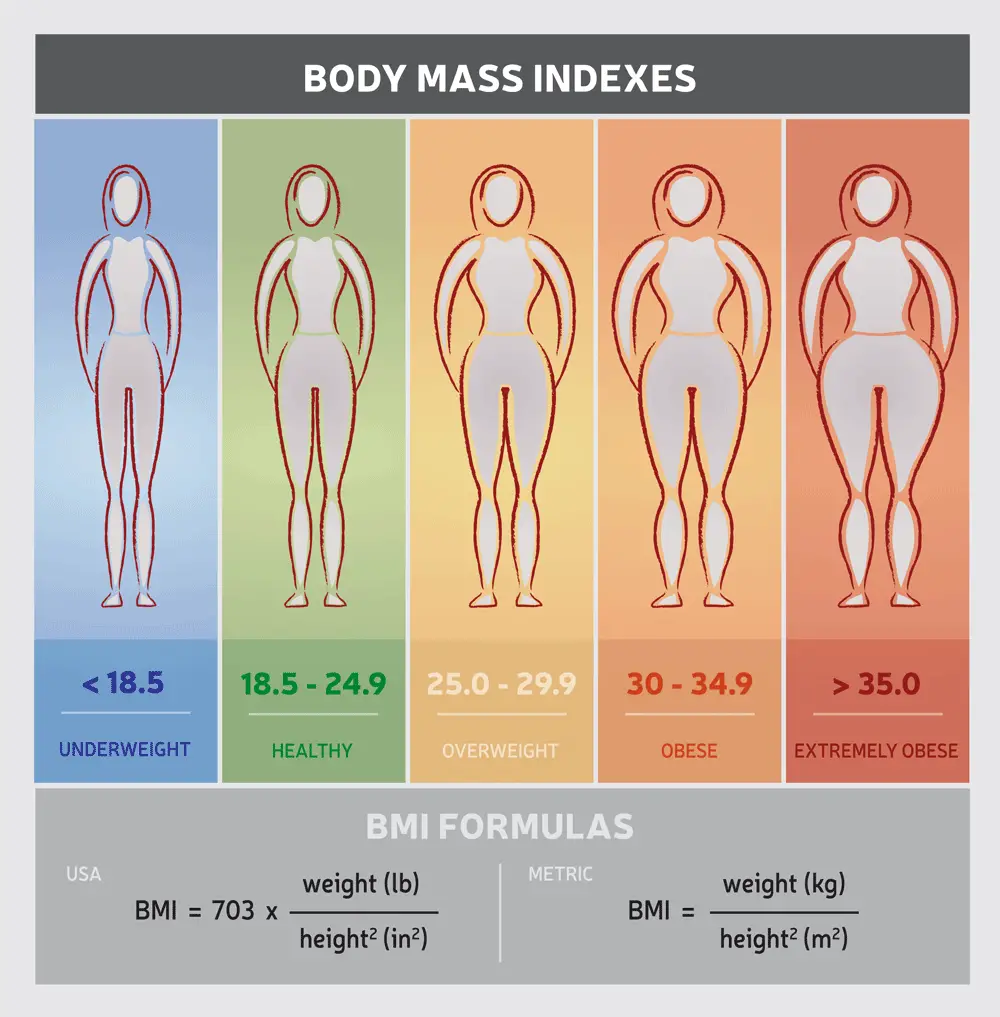BMI 6 is a body mass index calculator that can be used to measure the ratio of one’s weight to height. It is a tool used to determine whether someone is underweight, overweight, or at a healthy weight. The calculator takes into account gender, age, height, and weight to generate a result. A BMI 6 reading of 18.5 or below is considered underweight, 18.5 to 24.9 is considered a healthy weight, 25.0 to 29.9 is considered overweight, and 30.0 or above is considered obese. It is important to remember that BMI is not a direct measure of body fat and can be used as a general guideline when trying to assess one’s health.
It’s important to remember that BMI is not a direct measure of health. The results of BMI 6 can be used in conjunction with other measures, such as body fat percentage and waist circumference, to have a more accurate assessment of one’s health. Additionally, BMI 6 should not be used as the sole determinant of health and should be supplemented with other measures. It is also important to note that BMI 6 may not be accurate for some individuals. Factors such as ethnicity and lifestyle can affect the accuracy of the calculation. A person’s individual medical history and family history should be taken into account when trying to determine whether they are at a healthy weight. Overall, BMI 6 is a useful tool to use when trying to assess one’s weight and health. While the calculator should not be used as the sole determinant of health, it can be a helpful guideline when trying to assess one’s weight. When used in conjunction with other measures, such as body fat percentage and waist circumference, it can provide a more accurate assessment of one’s health.
bmi 510 male
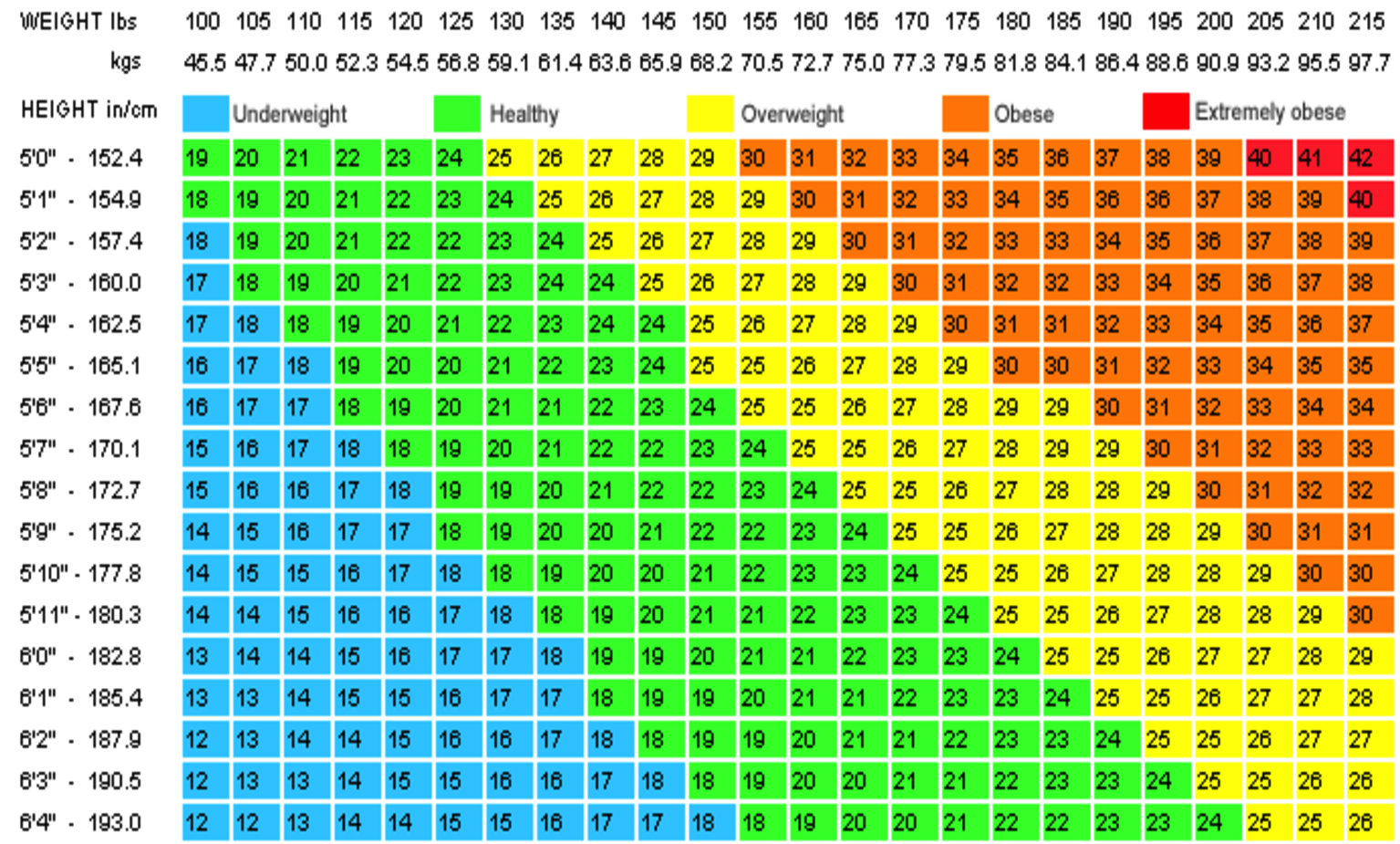
A person with a BMI of 510 is considered to be very overweight and is at a higher risk for health issues. In comparison, a person with a BMI of 6 is considered to be of a healthy weight. Generally, it is recommended for individuals to maintain a BMI between 18.5 and 25. Anything below 18.5 is considered to be underweight, and anything above 25 is considered to be overweight. Being overweight or obese can lead to an increased risk of many health conditions, such as diabetes, heart disease, and stroke. Therefore, it is important to be aware of your BMI to ensure that you are keeping your weight in a healthy range.
What is a normal BMI for a man?
A BMI of 6 is considered extremely underweight. A BMI of 18.5-24.9 is considered normal for a man. This means a man should have a body weight that is proportionate to his height. A BMI of less than 18.5 is considered underweight while a BMI of 25-29.9 is considered overweight. If your BMI is above 30, it is considered obese.
It is important to note that BMI is not a perfect measure of health. Muscle mass and genetics also play a role in determining your overall health. A person with a higher muscle mass can have a higher BMI and still be considered healthy. It is best to speak with your doctor if you have any questions about your BMI. They can help you determine whether or not your BMI is within a healthy range and if any lifestyle changes are necessary. Overall, a normal BMI for a man is between 18.5 – 24.9. It is important to remember that BMI is just an estimate and should not be used to diagnose any medical condition. Consult your doctor to learn more about your BMI and how to stay healthy.
What is BMI and how do I compute my BMI?
A BMI of 6 is considered underweight. To calculate your BMI, you need to know your weight in kilograms and your height in metres. Then, divide your weight by your height squared. This will give you your BMI. For example, if you weigh 50kg and you are 1.6m tall, your BMI would be 19.53.
50/1.6^2 = 19.53. The BMI scale has a range of categories, from underweight (BMI below 18.5) to normal/healthy weight (BMI 18.5 to 24.9) to overweight (BMI 25 to 29.9) and obese (BMI over 30). It’s important to remember that BMI is just a measure of your body fat and it doesn’t take into account your age, sex, or muscle mass. It’s just a tool used to give an indication of your body fat. It’s important to speak to your doctor to get an accurate assessment of your health.
What does BMI stand for?
BMI stands for Body Mass Index. It is a measure of body fat based on your height and weight. BMI is an important indicator of overall health. A BMI of 6 indicates that you are very underweight. It is important to maintain a healthy BMI, as an unhealthy BMI can lead to a range of health issues. While an extremely low BMI, such as 6, is a sign of malnutrition and can be dangerous, it is still possible to be healthy with a low BMI. Eating healthy and engaging in physical activity can help you achieve and maintain a healthy BMI.
What is the value of BMI?
Body Mass Index (BMI) is an important measure used to determine a person’s overall health. It is calculated by dividing a person’s weight in kilograms by their height in meters squared. BMI is a useful way to determine if an individual is in a healthy weight range for their height. A BMI of 6 is considered to be extremely low and suggests that an individual is severely underweight. This can be associated with various health risks including an increased likelihood of an infection, anemia, and weakened bones.
It can also lead to malnutrition and can cause a person to feel fatigued and weak. It is important to strive for a healthy BMI range as it can be an indicator of good overall health. Eating a balanced diet, exercising regularly, and having a consistent sleep schedule can all help to achieve a healthy BMI. Monitoring BMI is an important way to ensure that an individual is maintaining their health. In conclusion, a BMI of 6 is considered to be extremely low and can indicate potential health issues. It is important to monitor BMI to ensure overall health, and to make sure that a person is in the healthy range. Eating a balanced diet, exercising regularly, and having a consistent sleep schedule can help to achieve this.
5 7 bmi chart
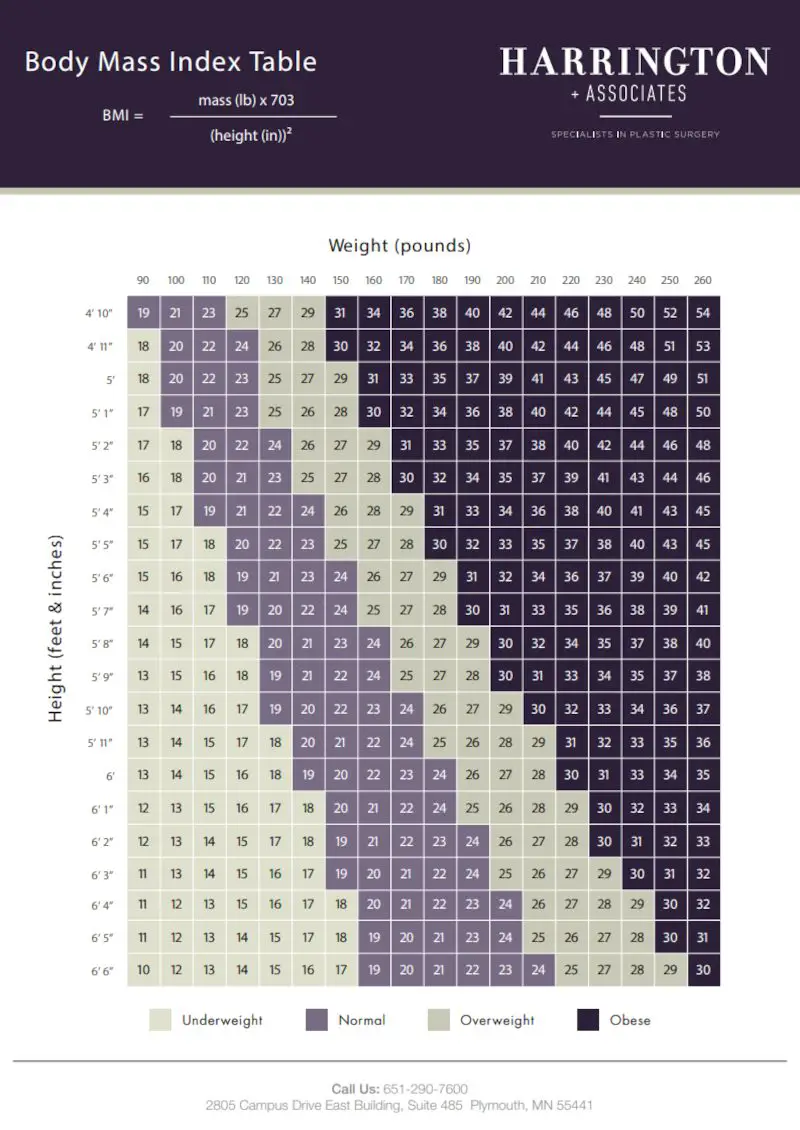
BMI 6 is part of the 5 7 BMI Chart. This chart is used to determine an individual’s body mass index (BMI). BMI is a measure of body fat based on height and weight. It is used to determine if a person is overweight or underweight for their height. The 5 7 BMI Chart is based on a person’s height in centimeters and weight in kilograms.
Using this chart, an individual’s BMI can be calculated by dividing the weight by the height squared. The numbers on the chart are used to determine what category a person falls into. A BMI of 6 means that an individual is considered to be underweight. The underweight range on the 5 7 BMI Chart is any BMI of less than 18.5. People with a BMI of 6 or below may have difficulty gaining weight and may be more susceptible to illnesses. Being underweight is not necessarily unhealthy. However, it is important to be aware of how your BMI may impact your health. Eating a balanced diet that is rich in nutrition and exercising regularly can help a person maintain a healthy BMI. It is important to realize that BMI is only one measure of a person’s overall health. Many other factors, such as muscle mass, genetics, and overall lifestyle, can affect an individual’s health. It is important to discuss any health concerns with your doctor to make sure you are maintaining a healthy weight.
What is the average weight for a 5 ‘ 7 male?
The average weight for a male who is 5’7″ is dependent on their body mass index (BMI). A BMI of 6 would indicate an extremely low weight for someone who is 5’7″. It is likely that this person would be classified as underweight. Generally, a healthy BMI for someone who is 5’7″ is 18.5 – 24.9. This would indicate a weight range of approximately 126-169 pounds.
If the person’s BMI is 6, then their weight would most likely be at the lower end of that range, around 126 pounds. Being underweight is not healthy and can lead to a variety of complications. If the person is extremely underweight, it is highly recommended that they consult with a medical professional to ensure they are getting the proper nutrition they need in order to stay healthy. It is important to maintain a healthy BMI, as being underweight or overweight can lead to adverse health effects. Eating a balanced diet and exercising regularly is the best way to maintain a healthy weight.
How to figure out your BMI formula?
In order to figure out your BMI formula, you will first need to know your height and weight. Once you have that information, you can use the standard BMI formula of weight in kilograms divided by height in meters squared (kg/m2). You can also use an online BMI calculator to make this calculation easier. If you are using the BMI formula, a BMI of 6 or lower indicates very severe thinness, a BMI between 17.5 and 24.9 is considered normal, and a BMI of 30 and above indicates obesity. It’s important to keep in mind that BMI is only one indicator of health, so other factors like diet, physical activity, and genetics should also be taken into account when assessing an individual’s overall health. It’s also important to remember that BMI is not a diagnostic tool and should not be used as the sole measure of an individual’s health. It’s only an indication of relative fatness or thinness and should be used in conjunction with other health-related measurements when making decisions about an individual’s health.
What is the BMI for 5 7 female?
This is a measure of her body fat based on her weight in relation to her height. A BMI of 6 falls within the healthy range for a 5’7″ female. Generally, a BMI of between 18.5 and 24.9 is considered healthy for a female of this size. A BMI of 6 indicates that the person is slightly underweight. To achieve and maintain a healthy weight for a person of this size, consuming a balanced diet and exercising regularly is recommended. With this combination of good nutrition and regular physical activity, any individual can reach and maintain a healthy weight and BMI.
What is the formula to calculate BMI?
BMI (Body Mass Index) is a measure of a person’s weight relative to their height. It is used to determine whether a person is underweight, overweight, or healthy. A BMI of 6 indicates that the person is severely underweight. The formula to calculate BMI is simple; it is calculated by dividing a person’s weight in kilograms by their height in metres squared (kg/m2). For example, if a person weighs 60kg and is 1.7m tall, they calculate their BMI by dividing 60kg by 1.7m x 1.7m, which gives a BMI of 20.76.
Healthy BMI is typically between 18.5 and 24.9. If the BMI is below 18.5, the person is categorized as underweight. If the BMI is over 24.9, the person is categorized as overweight. In the case of a BMI of 6, the person is significantly underweight and should seek medical advice immediately. It is recommended that they seek out a doctor and/or nutritionist who can help them reach a healthy weight.
5 4 bmi chart
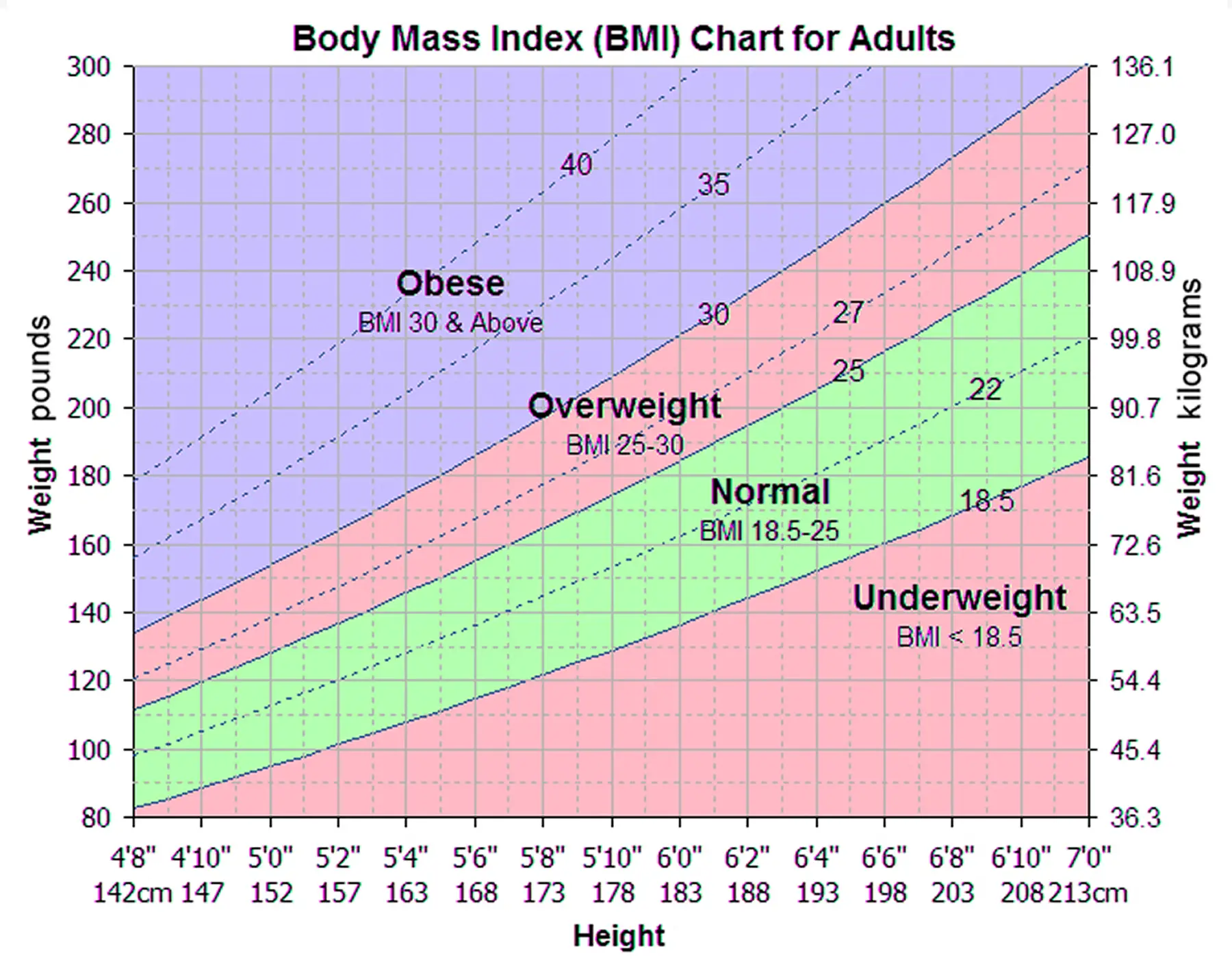
A BMI of 6 is considered underweight. A BMI chart, like the one with numbers 5 and 4, is a useful tool to help determine a person’s BMI. It provides a range of BMI numbers, with the 5 and 4 representing a BMI range of 16.5 to 18.5. A BMI of 16.5 or below is considered underweight, while a BMI of 18.5 is considered healthy. It is important to recognize that BMI does not take into account factors such as age, gender, and muscle mass, which can affect overall body fat.
A BMI chart can be helpful in determining if a person is underweight or if further medical attention is needed. Health care professionals use BMI charts to determine an individual’s risk for developing health problems related to weight. However, it is important to note that a 5 4 BMI chart is only one tool used to calculate BMI. Other factors, such as body fat percentage, waist circumference, and waist-to-hip ratio, may be used to determine more accurate results. Ultimately, a BMI of 6 as indicated on a 5 4 BMI chart should be considered as a guide and discussed with a doctor or other healthcare professional in order to make sure that the individual is at a healthy weight.
What is a normal BMI for a woman 5 4?
A BMI of 6 is considered to be underweight for a woman 5 ft 4 in tall. Generally, a BMI of 18.5 to 24.9 is considered to be in the normal range for adults. This means that a woman of this height should weigh between 103 and 139 pounds to have a normal BMI. Being underweight can lead to health problems such as weakened immunity, anemia, fatigue, and reproductive difficulties. Therefore, it is important for a woman of this height to maintain a healthy weight.
The best way to maintain a healthy BMI is to make sure to eat a balanced diet and stay active. Eating a variety of nutrient-rich foods, including fruits, vegetables, whole grains, and lean proteins, can help ensure that you are getting the nutrients you need to stay healthy. Additionally, incorporating physical activity into your daily routine can help you maintain a healthy body weight. It is important to note that BMI is only one measure of health and cannot be used to diagnose health conditions. If you are concerned about your weight, it is best to talk to your doctor to determine if you are at a healthy weight or if you need to make any lifestyle changes.
What is a good BMI by age?
Generally, a BMI of 18.5 to 24.9 is considered to be a healthy BMI by age. It is important to remember that every person is different, and what is considered to be a good BMI by age can vary depending on body type, gender, and physical activity. Having an age-appropriate BMI will help to keep your bones, muscles and internal organs healthy. It will also help to reduce the risk of developing conditions such as diabetes, heart disease and cancer. It is important to note that a BMI of 6 is not considered to be a safe BMI, and medical attention should be sought if this is the case.
A healthcare provider can help to identify the underlying cause and help to provide a safe and healthy weight goal. In conclusion, a good BMI by age is considered to be a BMI of 18.5 to 24.9. Having a lower BMI than this, such as a BMI of 6, is not considered to be a safe BMI and medical attention should be sought to ensure the health and safety of the individual.
What is the best weight for someone who is 5’4?
For someone who is 5’4″, a Body Mass Index (BMI) of 6 is considered to be in the healthy range. This means that the best weight for someone of this height would be between 103-124 lbs. Having a BMI of 6 means that the person’s weight is within a healthy range, as it is not too low or too high. This is important as having a BMI outside of the healthy range can lead to health risks such as heart disease, stroke, diabetes and certain types of cancer. Having a healthy BMI of 6 also means that the person is likely getting the necessary amount of nutrients and vitamins in their diet, which is important for overall health and wellbeing.
This is because when a person is at a healthy weight, their body is able to more effectively absorb and use the nutrients they consume. Another important aspect of having a BMI of 6 is that it may help to reduce the risk of developing mental health conditions such as depression, anxiety and stress. This is because having good physical health can help to improve overall mental health and well-being. Overall, having a BMI of 6 is an important indicator of being of a healthy weight for someone who is 5’4″. It is important to maintain this healthy weight so that you can reduce the risk of developing health problems and improve your overall wellbeing.
What is the appropriate weight for a 5’4 woman?
A 5’4 woman who has a BMI of 6 is considered underweight. This means that the woman would have an extremely low amount of body fat and a low amount of muscle mass, as the BMI is based on a person’s height and weight. The appropriate weight for a woman of this height and BMI would depend on her frame size. The average weight for a 5’4 woman would be between 114 and 149 pounds. However, people with a smaller frame should be on the lower end of this range, while those with a larger frame should be on the higher end.
It is important to understand that BMI is not an accurate measure of health. Other factors, such as body fat percentage, muscle mass, and overall health, should be taken into account when determining the ideal weight. If a woman of this height is trying to reach a BMI of 6, it is important to have a healthy approach to weight loss. This includes eating a balanced diet and engaging in regular physical activity. If these measures do not result in the desired weight, it is important to consult a doctor to ensure that no underlying conditions are present. Overall, the appropriate weight for a 5’4 woman with a BMI of 6 will depend on her frame size, as well as other factors related to her health. It is important to take a healthy approach to weight loss and to consult a doctor if the desired weight is not achieved.
How do you calculate BMI on a calculator?
Calculating BMI with a calculator can be a simple process. To calculate BMI on a calculator, you will need to know your height and weight measurements. Divide your weight in kilograms by the square of your height in meters. For example, if you are 1.75 meters tall and weigh 68 kilograms, the equation would be 68 divided by (1.75 x 1.75) = 22.4. This number is your BMI.
A BMI of 6 is considered severely underweight. This means that you have a very low amount of body fat and are considered to be at risk of health complications. If your BMI is 6, you should seek medical advice as soon as possible to get yourself back to a healthy weight range. A doctor can provide support and guidance which could include dietary advice or a tailored exercise regime. Making lifestyle changes can help to improve your BMI. Eating a balanced diet and increasing your physical activity can help to promote a healthier lifestyle and result in a healthier BMI. It is also important to note that BMI is only one indicator of health and should not be used to diagnose any health conditions.
bmi 5 8 male
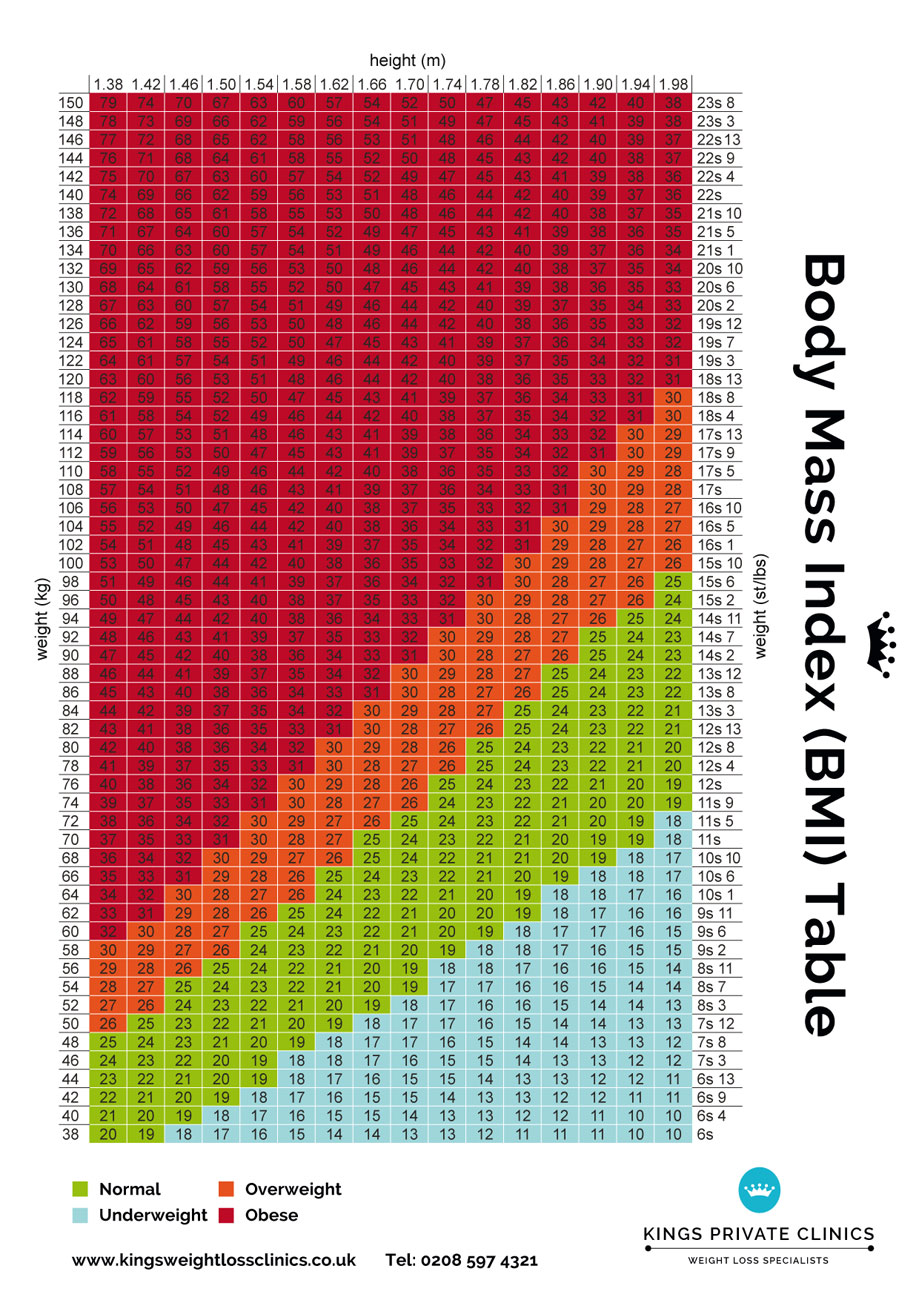
A BMI of 5 for a male is considered to be severely underweight. It is much lower than the ideal BMI of 6 which is considered to be a healthy weight. In order to maintain good health, a BMI of 6 should be the target in order to avoid any serious health problems. Being underweight is associated with a number of health risks, including weakened immune system, nutritional deficiencies and even an increased risk of developing certain types of cancer. It is important to find the right balance of diet and exercise to ensure a healthy body weight.
Eating a balanced diet and exercising regularly can help improve overall health and BMI. It is recommended to consult a healthcare professional if a BMI of 5 is observed, especially if it is a sudden change. They can provide personalized advice and guidance to help you reach a healthy BMI. It is essential to maintain a healthy BMI for overall wellbeing. A BMI of 6 is a good indicator of good health and should be the target to strive for.
What is the average weight for a 5 ‘ 8 male?
The average weight for a 5′ 8″ male with a BMI of 6 is around 136 pounds. This is a relatively low BMI, which is considered to be underweight. Being underweight can be just as risky as being overweight and can increase the risk of developing health problems such as osteoporosis, anemia, and weakened immune systems. It is important to reach and maintain a healthy weight through a balanced diet and regular exercise. Talking to a doctor or nutritionist can help to find the right nutrition plan for an individual’s body type and lifestyle. It is always important to take into account age, body type, and lifestyle when calculating a healthy weight.
Can a 5’8 male be a model?
Yes, a 5’8 male can be a model. Height is an important factor in the modeling industry, and 5’8 is considered an average height for male models. However, body mass index (BMI) is an equally important factor. Having a BMI of 6 is too low for a male modeling career. Male models typically need to have a BMI of at least 18.5.
At a BMI of 6, a 5’8 male would be significantly underweight and would not be suitable for a modeling career. The modeling industry requires models to be healthy and a BMI of 6 does not indicate a healthy lifestyle. Therefore, it is not possible for a 5’8 male with a BMI of 6 to be a successful model. To become a model, the male would need to reach a healthier BMI. By maintaining a proper diet and exercising regularly, the 5’8 male can reach the desired BMI. Once the male has achieved a satisfactory BMI, he can pursue modeling. He would need to build a portfolio with pictures that showcase his looks and physical features. He should also have an impressive rГ©sumГ© and look into any agencies that recruit models. With enough hard work and dedication, it is possible for a 5’8 male to become a successful model. It does require some effort, but with the right mindset, anything is possible.
What is the average weight for 5 ‘8?
A BMI of 6 indicates that an individual is considered underweight. So, what is the average weight for someone who is 5’8″? Generally speaking, the recommended weight for someone 5’8″ tall is between 112 and 149 pounds. This range is determined by taking the individual’s BMI into account and providing a healthy weight for their height. However, this range can vary depending on the individual’s body type. Those with a smaller frame will have a lower recommended weight, whereas those with a larger frame may have a higher recommended weight.
Additionally, those with more muscle mass may require a higher recommended weight. In conclusion, the average weight for someone 5’8″ tall with a BMI of 6 is somewhere between 112 and 149 pounds. This range is based on the individual’s body type, frame size, and muscle mass. It is important to understand that this range may vary depending on the individual.
What is average weight for 5 foot 8 in. male?
The average weight for a 5 foot 8 inch male is around 160 pounds. However, to determine if this weight is within a healthy BMI range for this male, you need to calculate his BMI. A BMI of 6 for a 5 foot 8 inch male would indicate that he is severely underweight. This could have numerous health implications, including weakened immune systems, increased risk of injury, and even malnutrition. It is important to maintain a healthy weight to ensure that your body functions optimally.
Making small changes to your diet and lifestyle can help you achieve and maintain a healthy weight. Eating healthy foods and exercising regularly are essential for maintaining a healthy lifestyle. You should also be mindful of the amount of calories you consume and the types of foods you eat. Staying hydrated is also important for overall health. Finally, if you are concerned about your weight, it is best to consult a doctor or nutritionist. A doctor can help you to assess your weight status and determine a healthy weight range. With their help, you can make changes to your lifestyle to reach a healthy weight and maintain it.
5 9 bmi chart
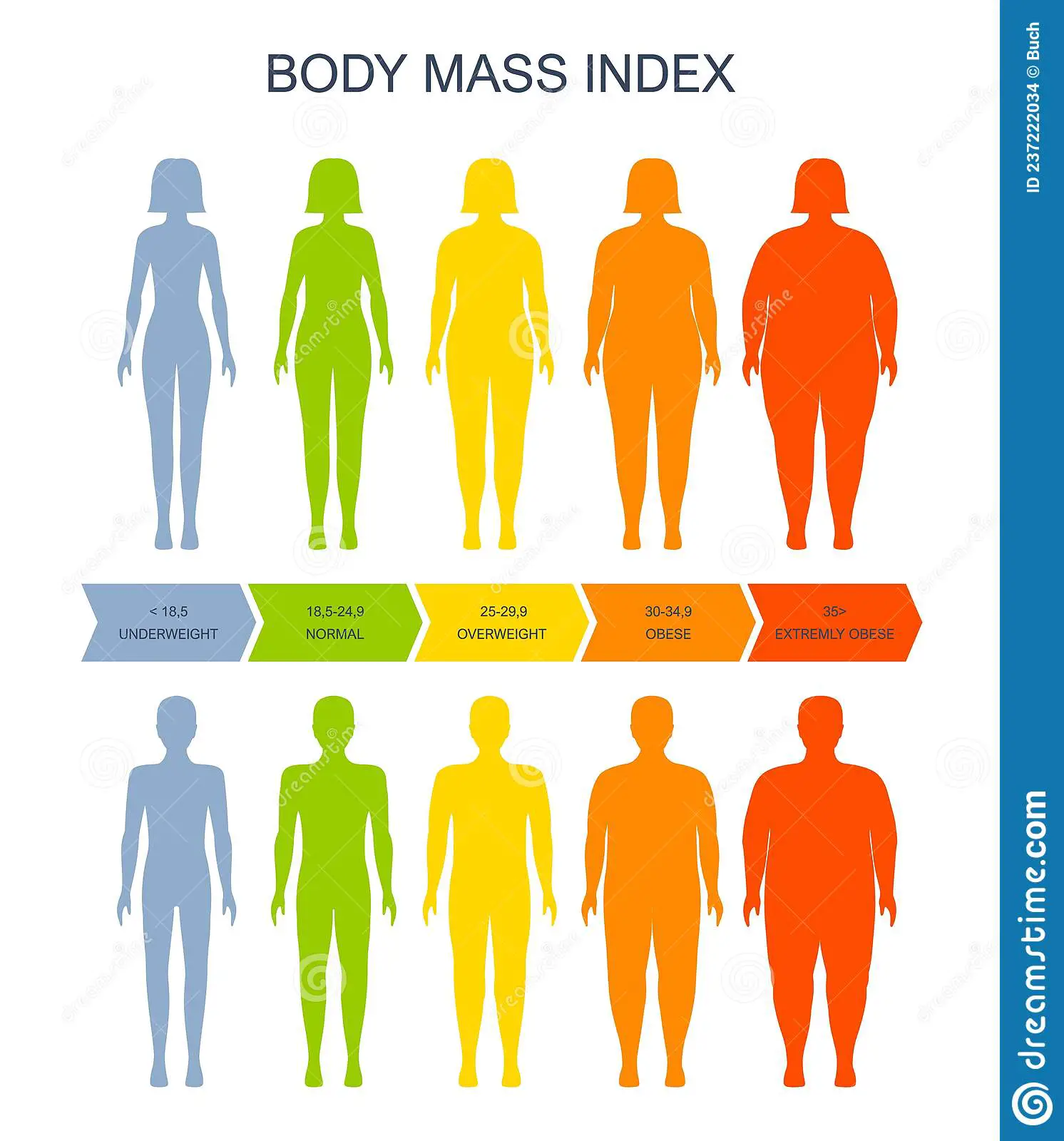
BMI 6 is a category on the BMI (Body Mass Index) chart. The BMI chart is a tool used to calculate and categorize an individual’s weight relative to their height. It is an easy way to measure and understand body fat. A BMI 6 rating is considered to be in the “underweight” category, meaning that a person’s BMI is below the median range. A BMI of 5 and 9 are both considered to be underweight, with 5 being the lowest.
Underweight persons are those whose BMI is lower than 18.5 and may be at a greater risk of malnutrition and associated health risks. People with a BMI of 6 should talk to their doctor about ways to gain a healthy amount of weight to reach a healthier BMI. Eating a balanced diet, exercising regularly, and getting enough sleep are all important for a healthy lifestyle. Additionally, it’s important to remember that BMI is not the only tool available to measure health. Many other biomarkers, such as blood pressure, cholesterol levels, and blood sugar levels, should be monitored to obtain a clearer picture of one’s health. Overall, a BMI of 6 is classified as underweight and individuals with this BMI should take extra care to maintain a healthy lifestyle. Keeping track of one’s BMI, as well as other factors, is important for overall health and well being.
What is the normal weight for someone who is 5’9?
For someone who is 5’9″, the normal weight for a BMI of 6 is around 135 pounds. This is the ideal weight range that is generally accepted to maintain healthy body mass. Being at this weight range means that you are not overweight or underweight, and can maintain a healthy body mass index. A BMI of 6 is considered within the healthy weight range. It is the ideal body mass index that is most likely to reduce your risk of developing health problems.
A BMI of 6 indicates that you are likely at a healthy weight and able to maintain a healthy lifestyle. While being at the correct weight range is important to maintain a healthy lifestyle, it is also important to take into account your age, gender and overall activity level. Age and gender can impact your ideal weight and overall activity levels can also affect how much you should weigh. It is important to remember that being within a healthy weight range does not guarantee that you will not face health problems. It is important to maintain a healthy diet and lifestyle in order to minimize your risk of developing any health problems. In conclusion, if you are 5’9″ and have a BMI of 6, you are likely considered within the healthy weight range. However, it is important to take into account other factors such as age, gender and activity level to ensure that you can maintain a healthy lifestyle.
What is the average weight for a 5 ‘ 9 female?
The average weight for a female who is 5 feet 9 inches tall with a BMI of 6 is generally around 115 pounds. A BMI of 6 is considered to be very underweight and this is why the average weight is relatively low. It is important to remember that everyone is different and therefore this weight may not be the same for everyone. It is also worth noting that having a BMI of 6 is not generally considered to be healthy. It is recommended that this BMI should be increased to at least 18.5 in order to achieve a healthy body weight. You can do this by eating a balanced diet and exercising regularly. It is important to get regular medical advice in order to make sure you are achieving a healthy body weight that is right for you.
What is considered in the ideal BMI?
An ideal BMI is considered to be between 18.5 and 25. Having a BMI below 18.5 is considered underweight, and anything over 25 is considered overweight. Being overweight or underweight can increase your risk of various health conditions like diabetes, heart disease, hypertension, and stroke. A BMI of 6 is considered to be very low and puts you at a higher risk of these medical issues. Having an ideal BMI can help you maintain a healthy weight and lifestyle.
Eating a balanced diet and exercising regularly can help you to maintain a healthy BMI, as well as reduce stress and improve your overall health. In addition to diet and exercise, a good night’s sleep is essential for maintaining an ideal BMI. Sleep helps to regulate hormones, which can affect your weight, metabolism, and overall health. Lastly, drinking plenty of water can also help to maintain a healthy BMI. Water keeps your body hydrated and helps to flush out toxins, which can help to reduce bloating and improve your overall health. Achieving and maintaining an ideal BMI is important for maintaining a healthy lifestyle.
How to determine your BMI score?
A BMI score of 6 specifically indicates an underweight person. To calculate your BMI score, you will need to know your weight (in kg) and your height (in metres). To start, divide your weight (in kg) by your height (in metres) to get your BMI score. For example, if your weight is 50kg and your height is 1.5m, your BMI score would be 50/1.5 which is 33.3. Once you know your BMI score, you can determine whether you are underweight.
A BMI of 6 or below is considered to be underweight. It is important to note that a BMI of 6 or below does not necessarily indicate that a person is unhealthy. However, if you have a BMI of 6 or below, it is important to speak with your doctor to check for any underlying health issues that may be causing you to be underweight. It is also important to note that being underweight can have negative effects on your health, such as fatigue, weakened immune system, and a higher risk of certain diseases. By calculating your BMI, you can get a better understanding of your health status. Knowing your BMI will help you to make healthier lifestyle choices and stay on track with your health goals.
bmi 6 1 male
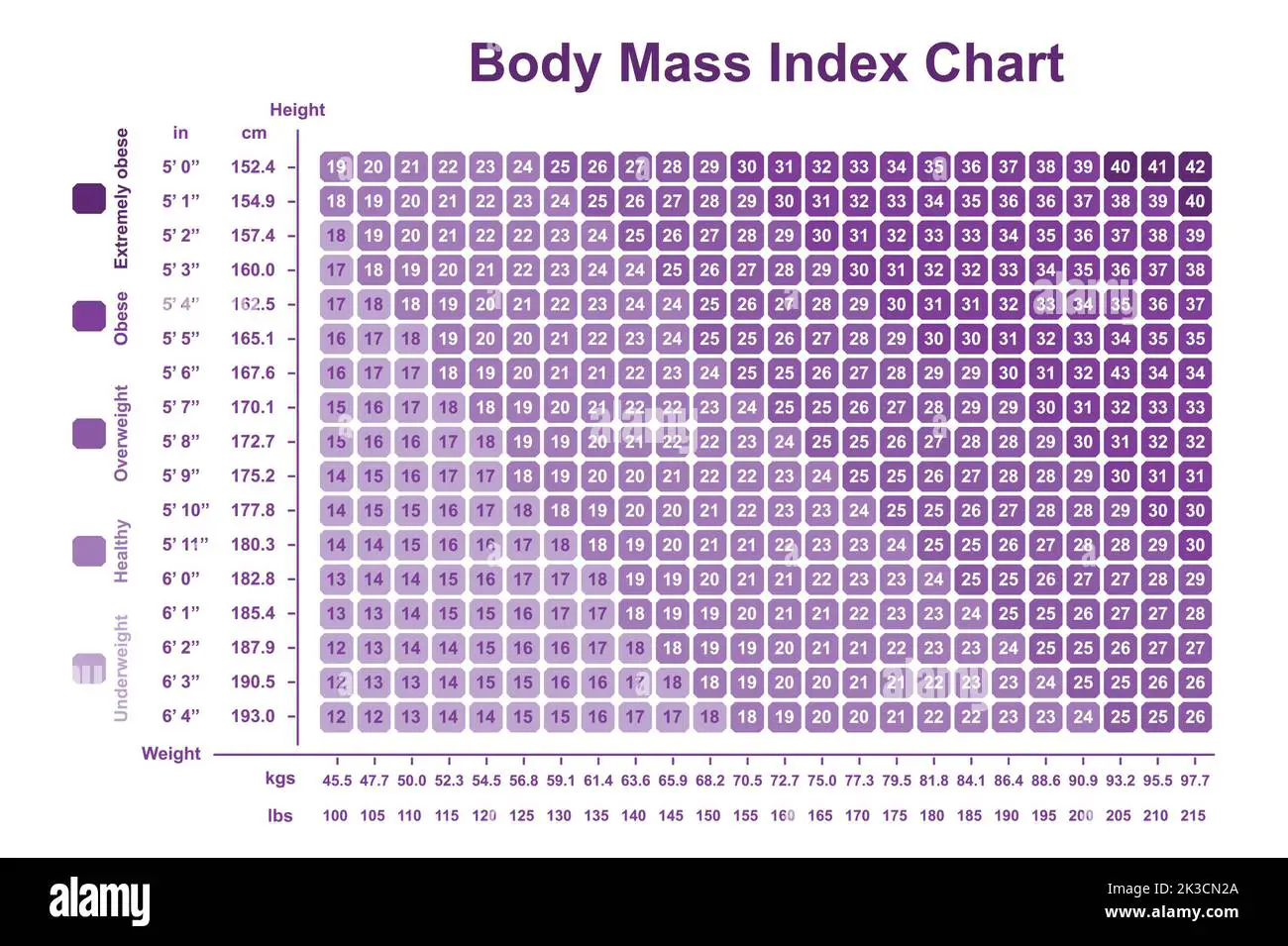
A BMI of 6 is classified as severely underweight according to the World Health Organization. A 6 BMI in a male of 6 feet 1 inch is an extreme example of an underweight individual and could be a sign of a serious health issue. This individual may be at risk for a number of health complications, including weakened bones, muscular wasting, poor immunity and a weakened cardiovascular system. In order to prevent any further health complications, it is important for this individual to speak to a doctor or nutritionist to find out the best course of action to gain weight safely and healthily. It is also important to practice healthy diet and exercise habits.
A balanced diet that includes all the essential nutrients, vitamins and minerals is key for gaining and maintaining a healthy weight. Exercising regularly can also help to improve the individual’s overall health and build muscle. Finally, it is important to be careful when gaining weight, as it is possible to gain too much weight too quickly, which can lead to further health issues. Gaining weight should be done in a healthy and gradual manner.
What is a good BMI for a man 6 1?
A BMI of 6 is considered healthy for a man 6’1″ tall. It falls within the 18.5-24.9 range for healthy body weight. A BMI of 6 suggests that a 6’1″ man has a healthy body weight for his height. Generally speaking, having a BMI of 6 means that this man has a healthy percentage of body fat and is of a healthy overall weight for his height. However, it is important to note that a single BMI score does not provide an accurate description of overall health.
Many other factors contribute to health and should also be taken into consideration, such as regular physical activity, nutrition, and overall lifestyle. A BMI of 6 is a sign that a 6’1″ man is in good health, but he should also be mindful of other factors that can affect his overall wellbeing. Eating a balanced diet, exercising regularly, and getting enough sleep are all great ways to maintain a healthy lifestyle.
What is good BMI men?
A BMI of 6 is considered extremely low and is considered very unhealthy. BMI stands for Body Mass Index, which is a measure of body fat based on height and weight. A BMI of 6 in men is associated with a high risk of health problems such as weakened immunity, infertility, and osteoporosis. In general, a healthy BMI for men should range between 18.5 and 24.9. This means that a BMI of 6 is far below the recommended amount and should be addressed with a doctor to assess the underlying causes.
Being underweight is just as bad for the body as being overweight, so it’s important to take steps to reach a healthy BMI if you have a BMI of 6. Eating a balanced diet and getting regular exercise are both important for achieving a healthy BMI. Additionally, if you are struggling to gain weight, a doctor may recommend supplements or other interventions to help. Overall, it is important for men to have a BMI between 18.5 and 24.9 for optimal health. A BMI of 6 is extremely low and can cause serious health problems, so it is important to take steps to reach a healthy BMI if you are in this range.
What is the average BMI for men?
The average Body Mass Index (BMI) for men is usually somewhere between 18.5 and 25. This is an indication of whether a person is at a healthy weight. BMI 6, however, is considered very low and could indicate an individual is severely underweight. In order to calculate BMI, a person’s height and weight must be known. BMI is then determined by dividing the weight in kilograms by the height in meters squared.
Generally, the lower the BMI, the higher the risk of health issues, such as high blood pressure or heart problems. Maintaining a healthy BMI is important for men in order to reduce their risk of health problems. For men, the average BMI range is between 18.5 and 25. This range is considered to be a healthy body mass index. Men who find their BMI is lower than the average range should visit their doctor to discuss healthy lifestyle changes to help reach a healthy Body Mass Index. Eating a balanced and nutritious diet, as well as getting regular exercise, can help increase BMI to healthy levels. In conclusion, the average BMI for men is 18.5 to 25. Anything lower, such as BMI 6, is considered to be very low and could indicate an individual is severely underweight. Men should aim to reach an average BMI to reduce their risk of health issues.
What is optimum BMI?
It is calculated by dividing your weight (in kilograms) by the square of your height (in metres). A BMI of 6 is considered very low and is associated with an increased risk of serious health complications. A BMI of 18.5 to 24.9 is referred to as the ‘optimum’ BMI range, indicating a healthy weight. Being within this range is recommended for overall good health, and is associated with a reduced risk of developing chronic diseases such as type 2 diabetes and heart disease. The optimum BMI range is different for different age groups.
For adults aged 19 to 64, a healthy BMI is 18.5 to 24.9, whereas for adults aged 65 and over, the BMI range is slightly higher at 22.5 to 29.9. Being at an optimum BMI is not only beneficial for physical health but also for good mental wellbeing. Eating a balanced diet and taking regular exercise can help you to reach and maintain a healthy BMI.
How much should I weigh BMI?
Your BMI, which is calculated from your weight and height, can be a useful tool for determining a healthy weight range for your body. A BMI of 6 falls into the underweight range, which is usually considered to be a BMI of 18.5 or lower. Being underweight can be just as dangerous as being overweight, so it is important to maintain a healthy weight. The ideal weight for someone with a BMI of 6 depends on the individual’s height and body composition. Generally, a BMI of 6 means a weight that is slightly lower than that of an average-sized person.
To figure out what a healthy weight would be for you, it is best to consult with your doctor and to use BMI calculators to help you track your progress. When aiming to achieve a healthy weight, it is important to focus on a balanced diet and an exercise regime that is tailored to your individual needs and lifestyle. Eating a balanced diet that is rich in fruits and vegetables, lean proteins and healthy fats can help you to maintain a healthy weight. Additionally, regular physical activity such as walking, biking, swimming or weight training can help to increase your muscle mass and lower your risk of chronic diseases. It is important to remember that BMI is only one indicator of a healthy weight and should not be used as a definitive measure. Even if your BMI is in the healthy range, you may still need to adjust your diet and exercise routine to reach your ideal weight. Consulting with a doctor or nutritionist is the best way to determine the right weight for your body and to ensure that it is achieved in a safe and healthy way.

